Soft Skill Training Purposes
28 Pages4465 Words70 Views
Added on 2021-06-14
Soft Skill Training Purposes
Added on 2021-06-14
ShareRelated Documents

I.IntroductionThis document is written for soft skill training purposes. It is about the skills an individual needsto be more successful in life and career. The document is divided into three main parts. The firstpart is the Introduction you are reading. The next part is LO1(Learning Outcome 1), which isabout demonstrating a range of interpersonal and transferable communication skills to atarget audience. In the third part, this document will show you about LO2(Learning Outcome2): Applying critical reasoning and thinking to a range of problem-solving scenarios. After that,in part fourth, I will tell you how I applied those skills in my life for an example. And the last partis the References where I point out the source that I have used in this document.Learning Outcome 1: Demonstrate a range of interpersonal andtransferable communication skills to a target audienceP1. Demonstrate, using different communication styles and formats, that you caneffectively design and deliver a training event for a given target audience.II.Communication skills1.Definition of communication skillsCommunication skills are the ability to give and receive kinds of information. We usethem to communicate with others efficiently in our daily life. With a good set ofcommunication skills, we can express our thoughts, our feelings, our desires to people ina clear way. Some examples of communication skills:1
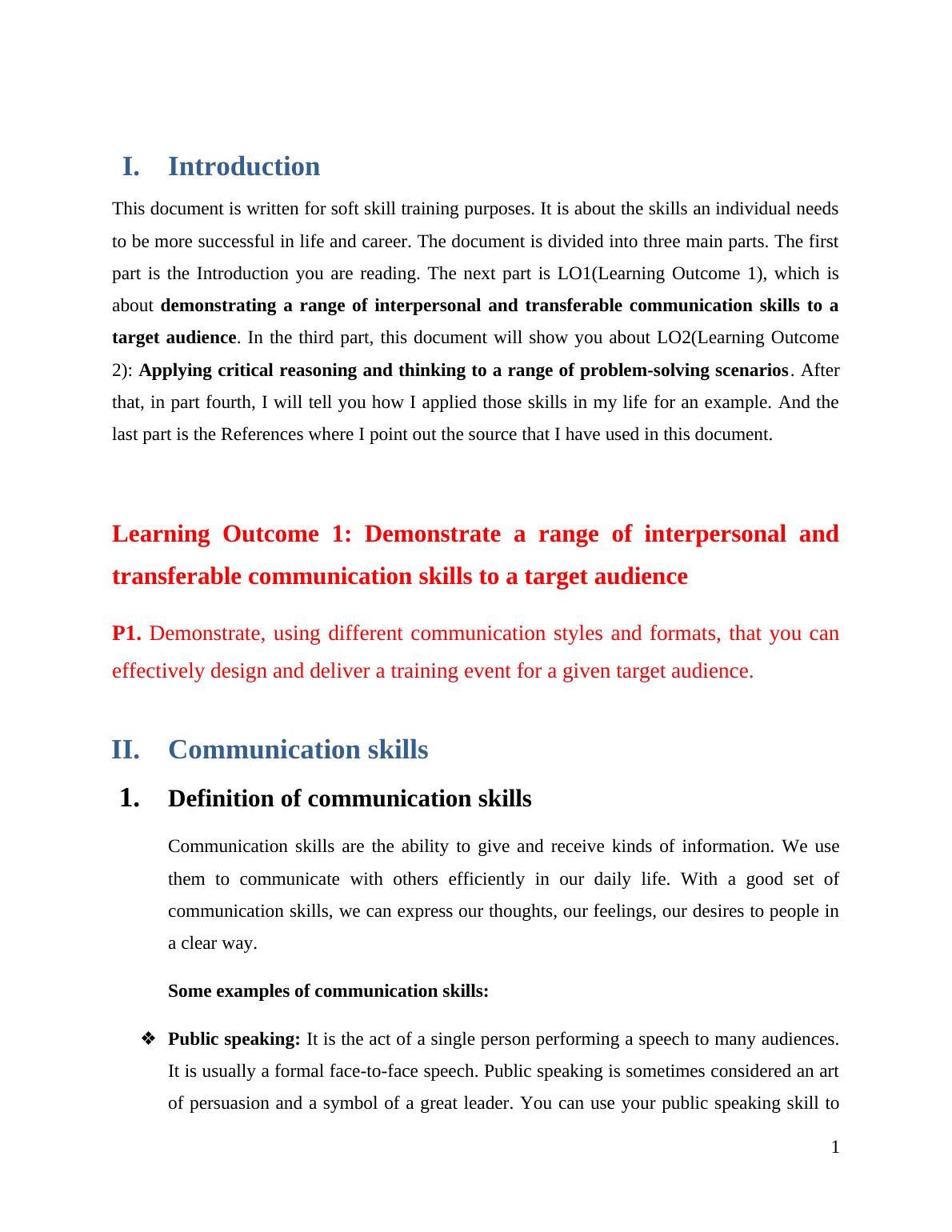
❖Public speaking: It is the act of a single person performing a speech to many audiences.It is usually a formal face-to-face speech. Public speaking is sometimes considered an artof persuasion and a symbol of a great leader. You can use your public speaking skill totransmit information, tell a story, motivate people to act as your demand. That is whypublic speaking is a powerful skill you will need to lead people as well as prove yourstrength, confidence, and talents.❖Active listening: Listening is something everyone with fully functioning ears can do, butnot everyone knows the active listening skill. Active listening means fully concentratingon what is being said by other people to truly understand the meaning of the speaker’swords, to see his/her thought, feelings about the problems they are talking about. It is ahard skill not just because we have to concentrate on what the speaker said for a longtime, but we also have to ‘show’ that we are listening to the speaker. However, withpractice, we can develop and master active listening skills.❖Teamwork: Teamwork is the collaborative between those who are working on a task(dictionary). So teamwork is generally understood as the willingness of a group ofpeople to work together to achieve a common goal.“Teamwork divides the task and multiplies the success.”Unknown.Teamwork skill is fundamental for teams to work effectively. With teamwork,teammates can observe and depend on the quality of each other’s work. Overall, itmakes the work’s result better. It also helps each individual participate in the team toimprove themselves by learning from each other. So in the modern days, havingteamwork skills is a must for everyone who wants to be successful in life.❖Presentation: We have to be clear on one thing first: presentation skill and publicspeaking skill is NOT the same. Presenting involves speaking to a specific objective,coordinating that speech with a series of images or slides that are designed to reinforcethat objective, and measuring the outcome. The presentation skill allows us to combine2
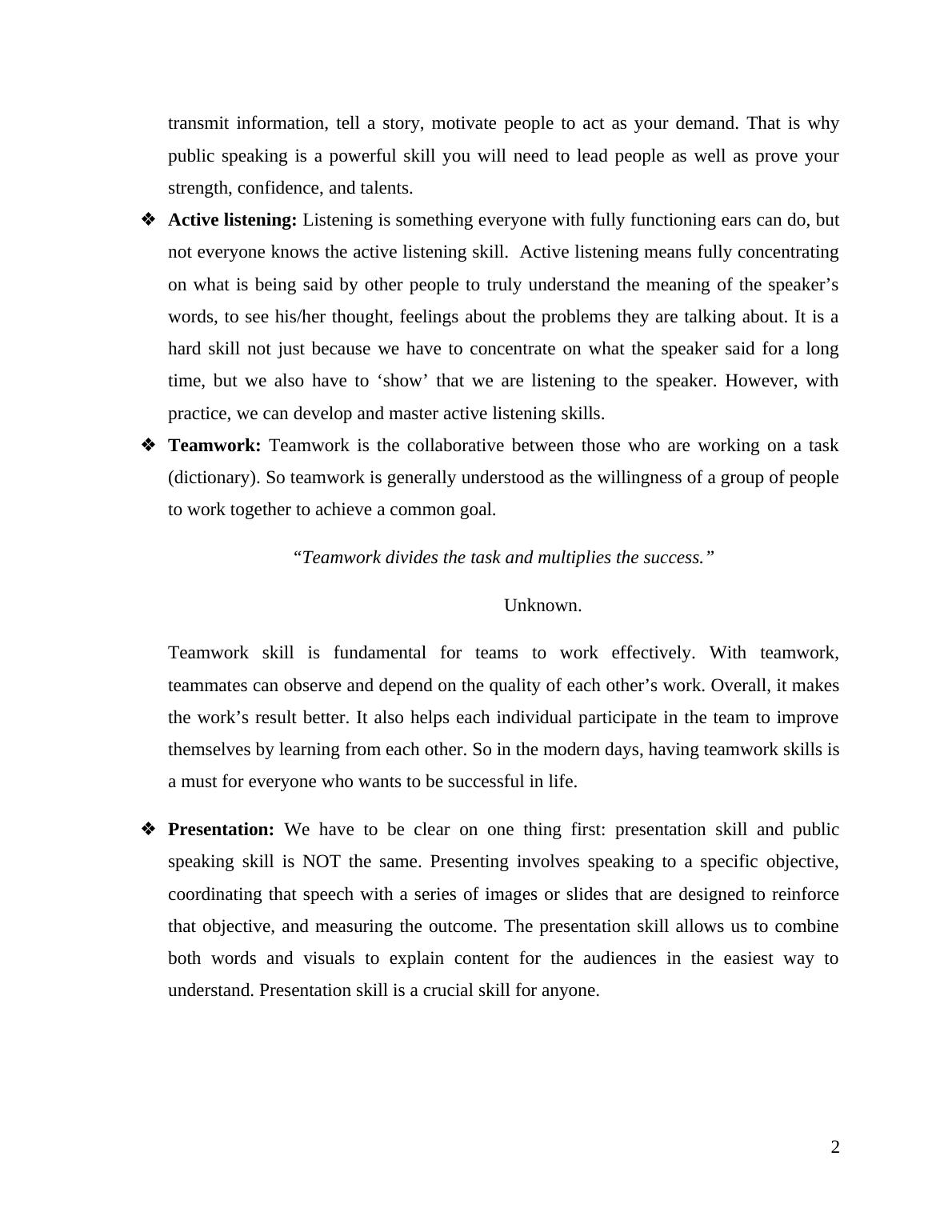
both words and visuals to explain content for the audiences in the easiest way tounderstand. Presentation skill is a crucial skill for anyone.2.Importance of having strong communication skillsBy some examples above, you might see how important communication skills are in ourlife. However, to be specific, here are the values of communication skills:❖Valued in the workplace: Having a strong set of communication skills will makeyour value increase so much in the eyes of your employers and colleagues. Itallows you to listen to others and show interest in what they say, dealing withproblems, work more efficiently, express opinions, or ask questions. In the longrun, it will help you climb the career ladder easier, and get you the respect fromother people.❖Creating better relationships: With good communication skills, you will be able toimprove your relationship with your employers, employees, and your personallife relationships. By listening carefully and offering quality feedback helpspeople around you feel heard and understood.❖In demand by businesses: We all know something about businesses, it is a largefield requiring a lot of, you guessed it, communication. Being an employer or abusinessman/woman will require a lot of communication. You will need it tobargain, discuss, and lead people to work efficiently. 3
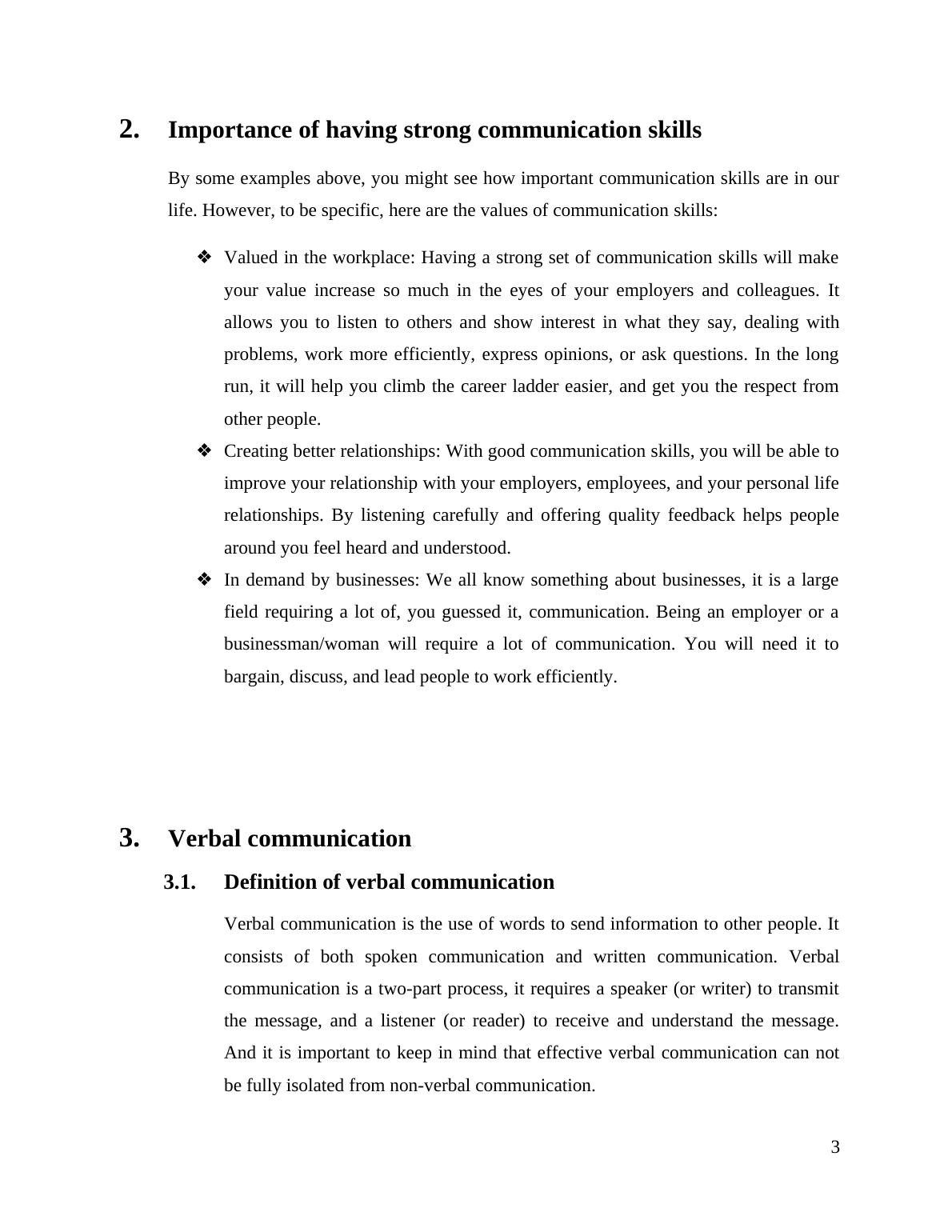
3.Verbal communication3.1.Definition of verbal communicationVerbal communication is the use of words to send information to other people.It consists of both spoken communication and written communication. Verbalcommunication is a two-part process, it requires a speaker (or writer) to transmitthe message, and a listener (or reader) to receive and understand the message.And it is important to keep in mind that effective verbal communication can notbe fully isolated from non-verbal communication.3.2.Some example of verbal communication skills❖Verbal Communication in a team: Every team needs good communication to besuccessful to finish the tasks. ➢Conveying messages concisely➢Encouraging reluctant group members to share input➢Explaining a difficult situation without getting angry➢Explaining that you need assistance➢Paraphrasing to show understanding➢Posing probing questions to elicit more detail about specific issues➢Receiving criticism without defensiveness➢Refraining from speaking too often or interrupting others➢Requesting feedback➢Stating your needs, wants, or feelings without criticizing or blaming❖Verbal Communication with Clients: If your work requires one-to-one meetingswith customers, then having strong verbal communication skills will help.➢Anticipating the concerns of others,➢Asking for clarification.➢Asking open-ended questions to stimulate dialogue.4
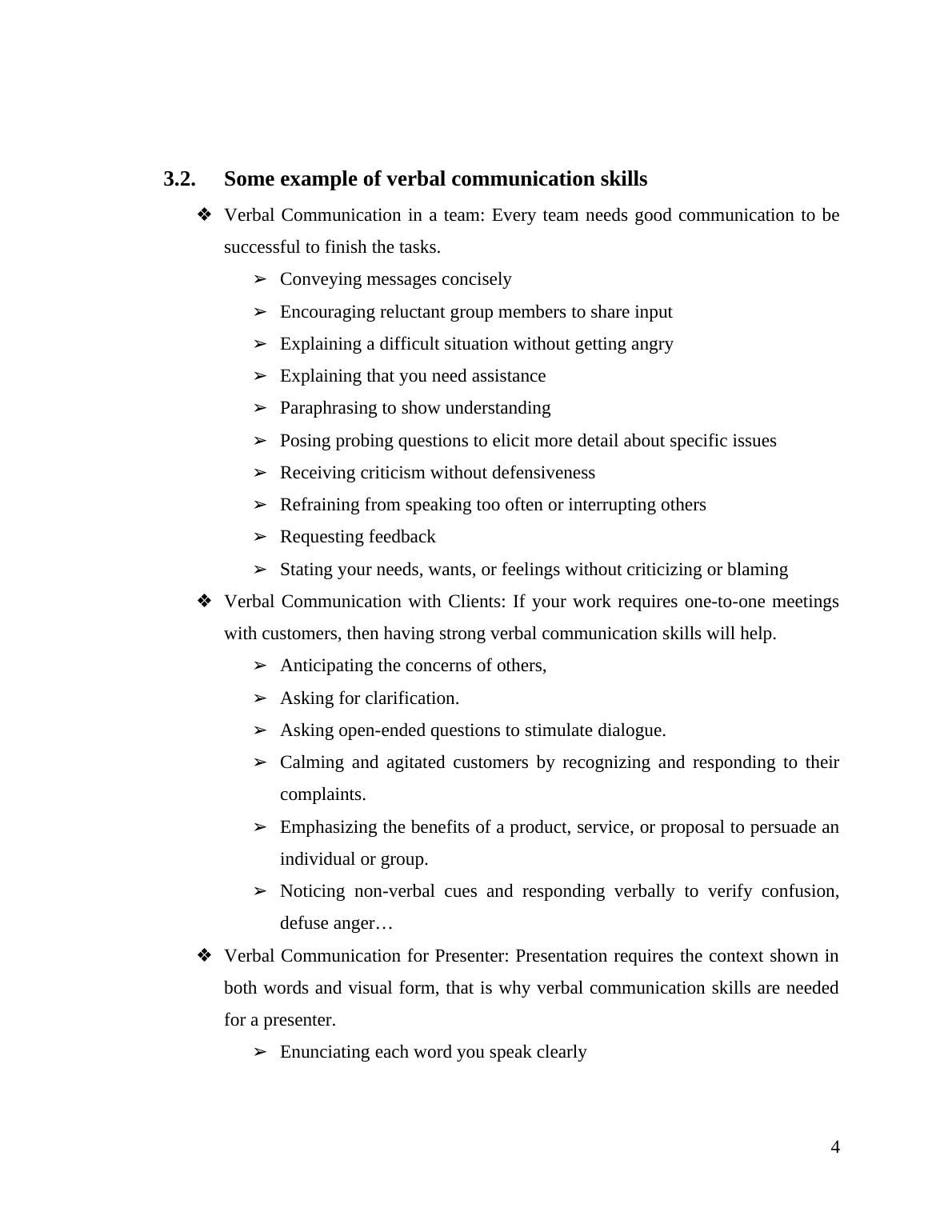
➢Calming and agitated customers by recognizing and responding to theircomplaints.➢Emphasizing the benefits of a product, service, or proposal to persuadean individual or group.➢Noticing non-verbal cues and responding verbally to verify confusion,defuse anger...❖Verbal Communication for Presenter: Presentation requires the context shown inboth words and visual form, that is why verbal communication skills are neededfor a presenter.➢Enunciating each word you speak clearly➢Introducing the focus of a topic at the beginning of a presentation orinteraction➢Planning communications before delivery➢Projecting your voice to fill the room➢Providing concrete examples to illustrate points➢Restating important points towards the end of a talk➢Selecting language appropriate to the audience➢Speaking at a moderate pace, not too fast or too slowly➢Speaking confidently but with modesty➢Summarizing key points made by other speakers➢Supporting statements with facts and evidence➢Tailoring messages to different audiences➢Telling stories to capture an audience➢Using humor to engage an audience5
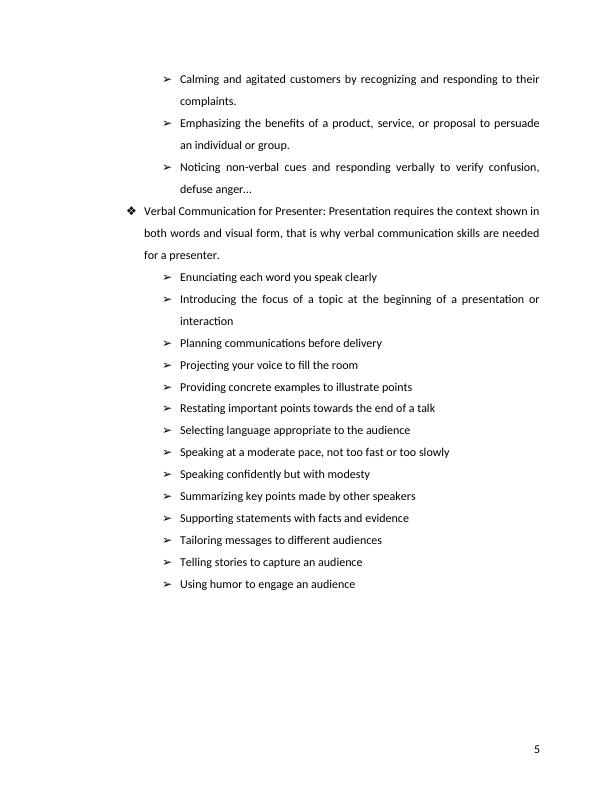
End of preview
Want to access all the pages? Upload your documents or become a member.
Related Documents
Principles of Effective Interpersonal Communicationlg...
|3
|664
|31
Foundations of Business Success: Public Speakinglg...
|5
|809
|494
Foundations of Business Success: Public Speakinglg...
|9
|2209
|299
ANALYSIS OF SPEECH The speech which is analysed here is thelg...
|2
|439
|256
BUS201 : Foundations of Business Successlg...
|5
|676
|115
Ethics and Social Work Practice | Assignmentlg...
|5
|1218
|19
